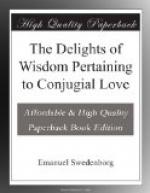herself grows vile, in the same degree that love for
a courtezan grows warm, and she is held in estimation.
In regard to the SECOND POSITION—that simultaneous
concubinage, or concubinage conjoined with a wife,
deprives a man of all faculty and inclination to conjugial
life, which is implanted in Christians from birth,
it may be seen from the following considerations:
that so far as love to a wife is changed into love
to a concubine, so far the former love is rent, exhausted,
and emptied, as has been shewn just above: that
this is effected by a closing of the interiors of
the natural mind, and an opening of its inferior principles,
may appear from the seat of the inclination with Christians
to love one of the sex, as being in the inmost principles,
and that this seat may be closed, but cannot be destroyed.
The reason why an inclination to love one of the sex,
and also a faculty to receive that love, is implanted
in Christians from birth, is, because that love is
from the Lord alone, and is esteemed religious, and
in Christendom the Lord’s divine is acknowledged
and worshipped, and religion is from his Word; hence
there is a grafting, and also a transplanting thereof,
from generation to generation. We have said, that
the above Christian conjugial principle perishes by
polygamical adultery: we thereby mean, that with
the Christian polygamist it is closed and intercepted;
but still it is capable of being revived in his posterity,
as is the case with the likeness of a grandfather
or a great-grandfather returning in a grandson or
a great-grandson. Hence, that conjugial principle
is called the most precious jewel of the Christian
life, and (see above, n. 457, 458,) the storehouse
of human life, and the reservoir of the Christian
religion. That that conjugial principle is destroyed
with the Christian who practises polygamical adultery,
is manifest from this consideration; that he cannot
like a Mahometan polygamist, love a concubine and a
wife equally; but so far as he loves a concubine,
or is warm towards her, so far he does not love his
wife, but is cold towards her; and, what is yet more
detestable, so far he also in heart acknowledges the
Lord only as a natural man, and the son of Mary, and
not at the same time as the Son of God, and likewise
so far he makes light of religion. It is, however,
well to be noted, that this is the case with those
who add a concubine to a wife, and connect themselves
actually with each; but it is not at all the case
with those, who from legitimate, just, and truly excusatory
causes, separate themselves, and keep apart from a
wife as to actual love, and have a woman in keeping.
We now proceed to treat of this kind of concubinage.
467. V. CONCUBINAGE APART FROM A WIFE, WHEN IT IS ENGAGED IN FROM CAUSES LEGITIMATE, JUST, AND TRULY EXCUSATORY, IS NOT UNLAWFUL. What causes we mean by legitimate, what by just, and what by truly excusatory, shall be shewn in their order: the bare mention of the causes is here premised, that this concubinage, which we are about to treat of, may be distinguished from that which we have previously described. (See note to No. 450, and the Preliminary note.)




